

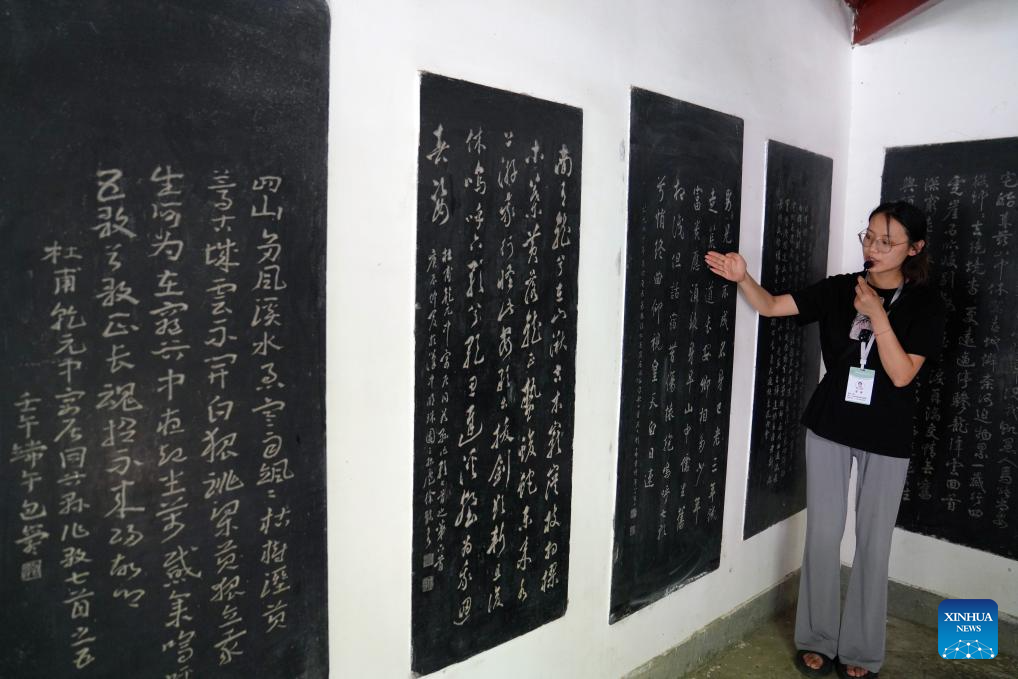
A tour guide introduces to tourists the poems of ancient Chinese poet Du Fu at a memorial site of Du Fu in Chengxian County of Longnan, northwest China's Gansu Province, July 13, 2025.
First built in 1123, the memorial site of ancient Chinese poet Du Fu, located at the mouth of Feilong Gorge in the southeast of Chengxian County. While renovations and reconstructions went uninterrupted over the past centuries, it now covers an area of 15 mu (one hectare) with main structures such as the ancestral hall and the stele forest.
Du Fu was a realist poet of the Tang Dynasty (618-907) and is often considered one of the greatest poets in Chinese history. To escape from the havoc of the An-Shi Rebellion, Du led his family southward to Chengdu in 759, and stayed in modern-day Chengxian County during the trip for about a month. This trip as a war refugee left a profound impact on Du and inspired many of his later realist works.
Today, the memorial site is a must-visit for nature lovers and those who want to have a better knowledge of Du Fu and the traditional culture. (Xinhua/Ma Ning)

Tourists take photos at the memorial site of ancient Chinese poet Du Fu in Chengxian County of Longnan, northwest China's Gansu Province, July 13, 2025.
First built in 1123, the memorial site of ancient Chinese poet Du Fu, located at the mouth of Feilong Gorge in the southeast of Chengxian County. While renovations and reconstructions went uninterrupted over the past centuries, it now covers an area of 15 mu (one hectare) with main structures such as the ancestral hall and the stele forest.
Du Fu was a realist poet of the Tang Dynasty (618-907) and is often considered one of the greatest poets in Chinese history. To escape from the havoc of the An-Shi Rebellion, Du led his family southward to Chengdu in 759, and stayed in modern-day Chengxian County during the trip for about a month. This trip as a war refugee left a profound impact on Du and inspired many of his later realist works.
Today, the memorial site is a must-visit for nature lovers and those who want to have a better knowledge of Du Fu and the traditional culture. (Xinhua/Chen Bin)
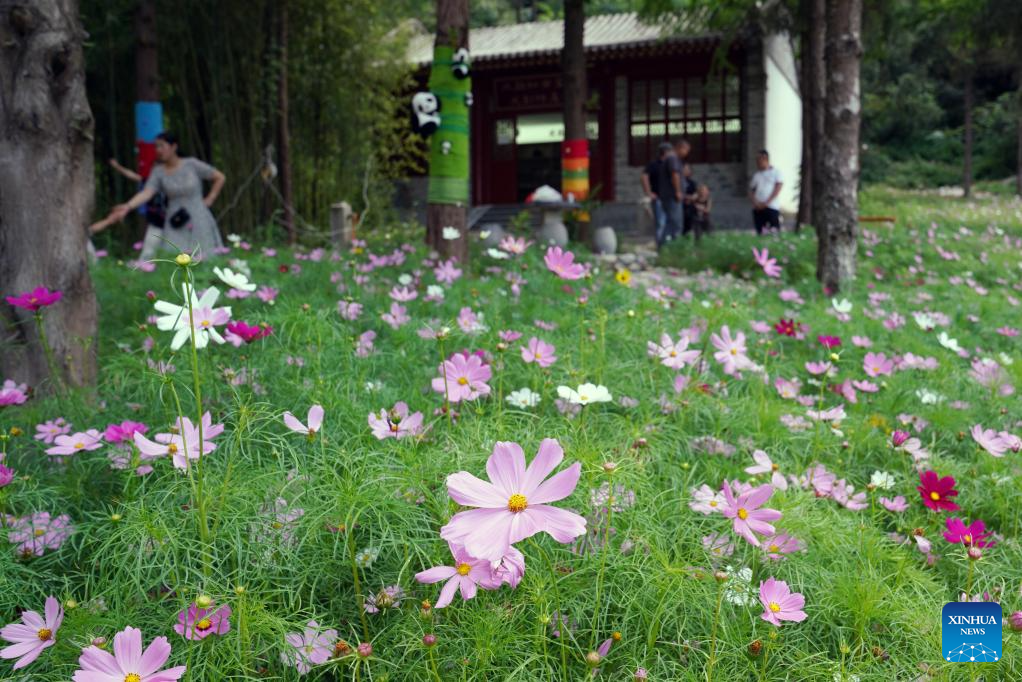
Tourists visit the memorial site of ancient Chinese poet Du Fu in Chengxian County of Longnan, northwest China's Gansu Province, July 13, 2025.
First built in 1123, the memorial site of ancient Chinese poet Du Fu, located at the mouth of Feilong Gorge in the southeast of Chengxian County. While renovations and reconstructions went uninterrupted over the past centuries, it now covers an area of 15 mu (one hectare) with main structures such as the ancestral hall and the stele forest.
Du Fu was a realist poet of the Tang Dynasty (618-907) and is often considered one of the greatest poets in Chinese history. To escape from the havoc of the An-Shi Rebellion, Du led his family southward to Chengdu in 759, and stayed in modern-day Chengxian County during the trip for about a month. This trip as a war refugee left a profound impact on Du and inspired many of his later realist works.
Today, the memorial site is a must-visit for nature lovers and those who want to have a better knowledge of Du Fu and the traditional culture. (Xinhua/Ma Ning)
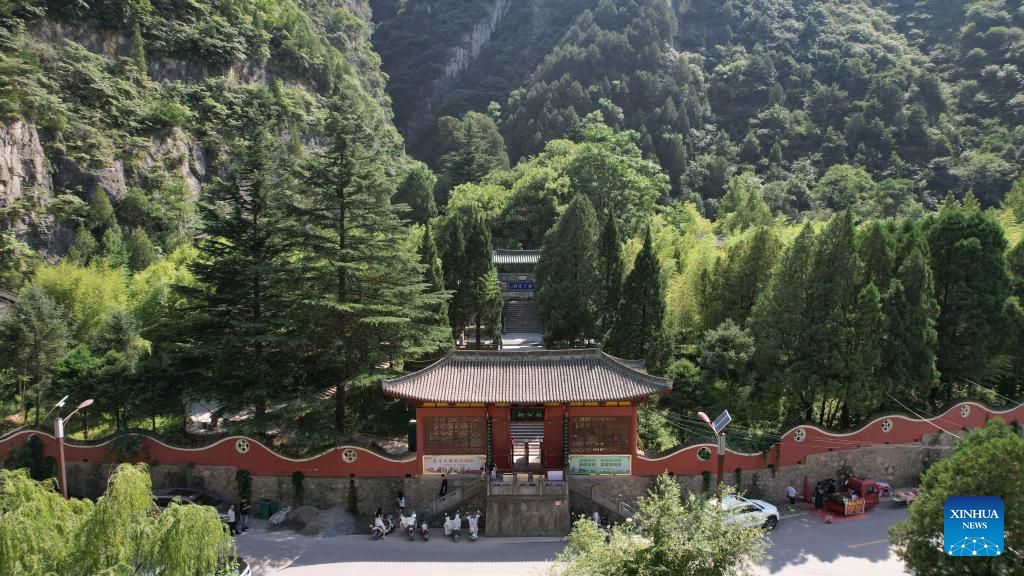
A drone photo shows a view of the memorial site of ancient Chinese poet Du Fu in Chengxian County of Longnan, northwest China's Gansu Province, July 13, 2025.
First built in 1123, the memorial site of ancient Chinese poet Du Fu, located at the mouth of Feilong Gorge in the southeast of Chengxian County. While renovations and reconstructions went uninterrupted over the past centuries, it now covers an area of 15 mu (one hectare) with main structures such as the ancestral hall and the stele forest.
Du Fu was a realist poet of the Tang Dynasty (618-907) and is often considered one of the greatest poets in Chinese history. To escape from the havoc of the An-Shi Rebellion, Du led his family southward to Chengdu in 759, and stayed in modern-day Chengxian County during the trip for about a month. This trip as a war refugee left a profound impact on Du and inspired many of his later realist works.
Today, the memorial site is a must-visit for nature lovers and those who want to have a better knowledge of Du Fu and the traditional culture. (Xinhua/Chen Bin)
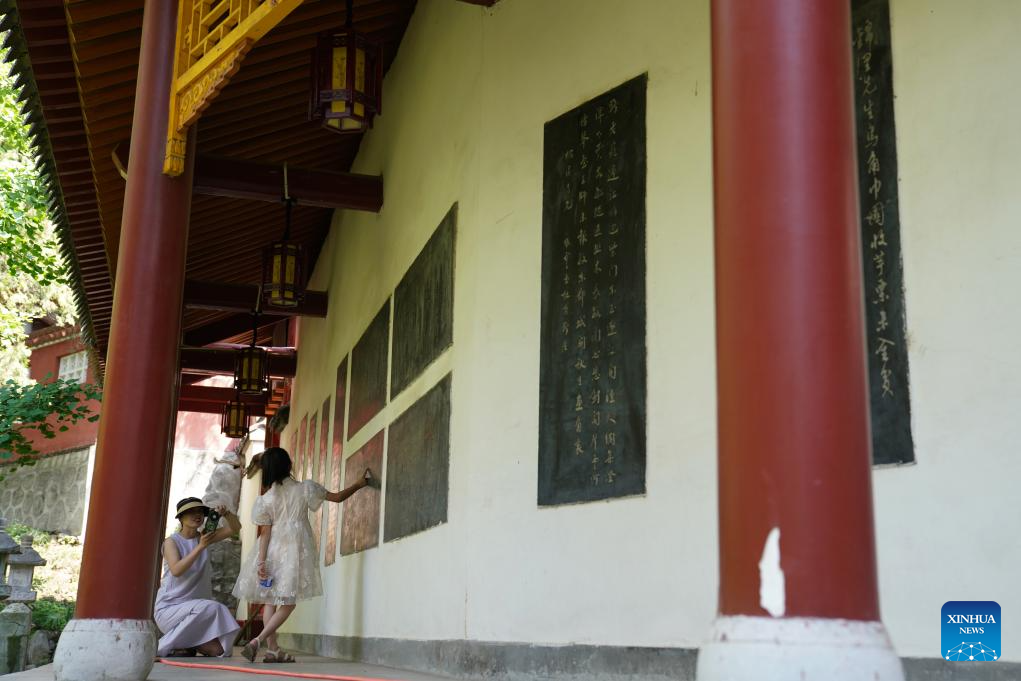
Tourists visit the memorial site of ancient Chinese poet Du Fu in Chengxian County of Longnan, northwest China's Gansu Province, July 13, 2025.
First built in 1123, the memorial site of ancient Chinese poet Du Fu, located at the mouth of Feilong Gorge in the southeast of Chengxian County. While renovations and reconstructions went uninterrupted over the past centuries, it now covers an area of 15 mu (one hectare) with main structures such as the ancestral hall and the stele forest.
Du Fu was a realist poet of the Tang Dynasty (618-907) and is often considered one of the greatest poets in Chinese history. To escape from the havoc of the An-Shi Rebellion, Du led his family southward to Chengdu in 759, and stayed in modern-day Chengxian County during the trip for about a month. This trip as a war refugee left a profound impact on Du and inspired many of his later realist works.
Today, the memorial site is a must-visit for nature lovers and those who want to have a better knowledge of Du Fu and the traditional culture. (Xinhua/Ma Ning)
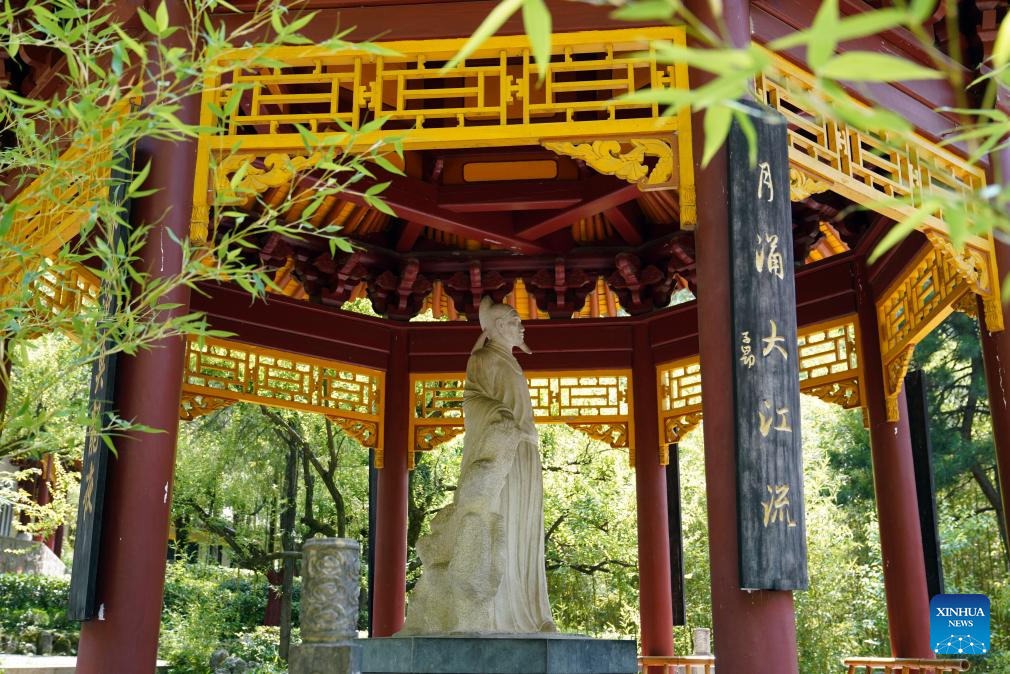
This photo shows a statue of ancient Chinese poet Du Fu at a memorial site of Du Fu in Chengxian County of Longnan, northwest China's Gansu Province, July 13, 2025.
First built in 1123, the memorial site of ancient Chinese poet Du Fu, located at the mouth of Feilong Gorge in the southeast of Chengxian County. While renovations and reconstructions went uninterrupted over the past centuries, it now covers an area of 15 mu (one hectare) with main structures such as the ancestral hall and the stele forest.
Du Fu was a realist poet of the Tang Dynasty (618-907) and is often considered one of the greatest poets in Chinese history. To escape from the havoc of the An-Shi Rebellion, Du led his family southward to Chengdu in 759, and stayed in modern-day Chengxian County during the trip for about a month. This trip as a war refugee left a profound impact on Du and inspired many of his later realist works.
Today, the memorial site is a must-visit for nature lovers and those who want to have a better knowledge of Du Fu and the traditional culture. (Xinhua/Ma Ning)
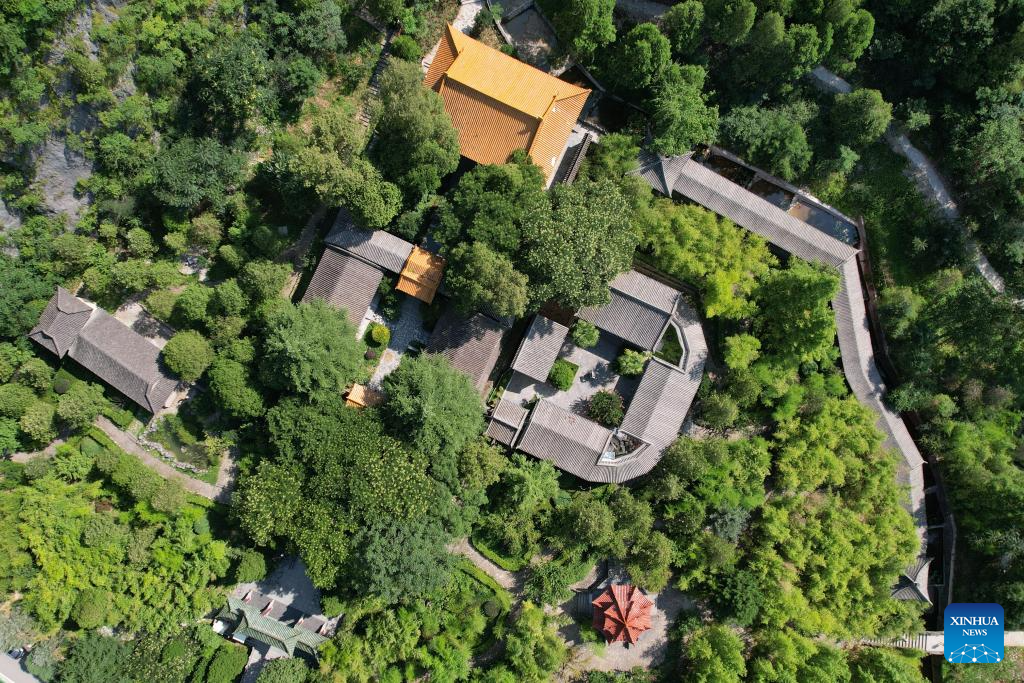
An aerial drone photo shows a view of the memorial site of ancient Chinese poet Du Fu in Chengxian County of Longnan, northwest China's Gansu Province, July 13, 2025.
First built in 1123, the memorial site of ancient Chinese poet Du Fu, located at the mouth of Feilong Gorge in the southeast of Chengxian County. While renovations and reconstructions went uninterrupted over the past centuries, it now covers an area of 15 mu (one hectare) with main structures such as the ancestral hall and the stele forest.
Du Fu was a realist poet of the Tang Dynasty (618-907) and is often considered one of the greatest poets in Chinese history. To escape from the havoc of the An-Shi Rebellion, Du led his family southward to Chengdu in 759, and stayed in modern-day Chengxian County during the trip for about a month. This trip as a war refugee left a profound impact on Du and inspired many of his later realist works.
Today, the memorial site is a must-visit for nature lovers and those who want to have a better knowledge of Du Fu and the traditional culture. (Xinhua/Chen Bin)
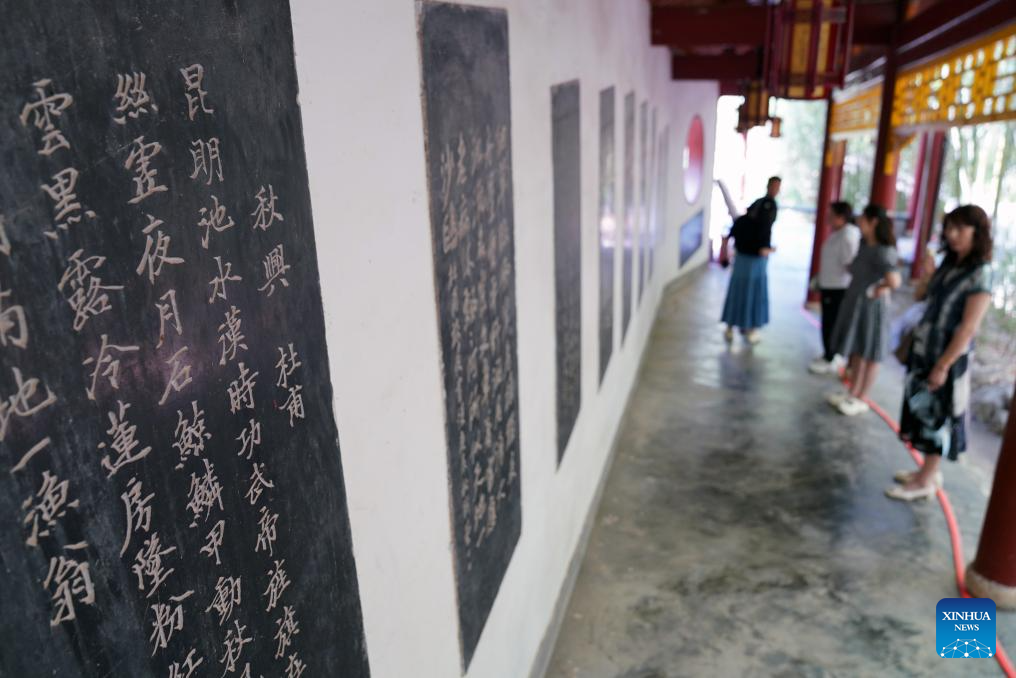
Tourists visit the stele forest at the memorial site of ancient Chinese poet Du Fu in Chengxian County of Longnan, northwest China's Gansu Province, July 13, 2025.
First built in 1123, the memorial site of ancient Chinese poet Du Fu, located at the mouth of Feilong Gorge in the southeast of Chengxian County. While renovations and reconstructions went uninterrupted over the past centuries, it now covers an area of 15 mu (one hectare) with main structures such as the ancestral hall and the stele forest.
Du Fu was a realist poet of the Tang Dynasty (618-907) and is often considered one of the greatest poets in Chinese history. To escape from the havoc of the An-Shi Rebellion, Du led his family southward to Chengdu in 759, and stayed in modern-day Chengxian County during the trip for about a month. This trip as a war refugee left a profound impact on Du and inspired many of his later realist works.
Today, the memorial site is a must-visit for nature lovers and those who want to have a better knowledge of Du Fu and the traditional culture. (Xinhua/Ma Ning)

A child draws at a tea house at the memorial site of ancient Chinese poet Du Fu in Chengxian County of Longnan, northwest China's Gansu Province, July 13, 2025.
First built in 1123, the memorial site of ancient Chinese poet Du Fu, located at the mouth of Feilong Gorge in the southeast of Chengxian County. While renovations and reconstructions went uninterrupted over the past centuries, it now covers an area of 15 mu (one hectare) with main structures such as the ancestral hall and the stele forest.
Du Fu was a realist poet of the Tang Dynasty (618-907) and is often considered one of the greatest poets in Chinese history. To escape from the havoc of the An-Shi Rebellion, Du led his family southward to Chengdu in 759, and stayed in modern-day Chengxian County during the trip for about a month. This trip as a war refugee left a profound impact on Du and inspired many of his later realist works.
Today, the memorial site is a must-visit for nature lovers and those who want to have a better knowledge of Du Fu and the traditional culture. (Xinhua/Chen Bin)
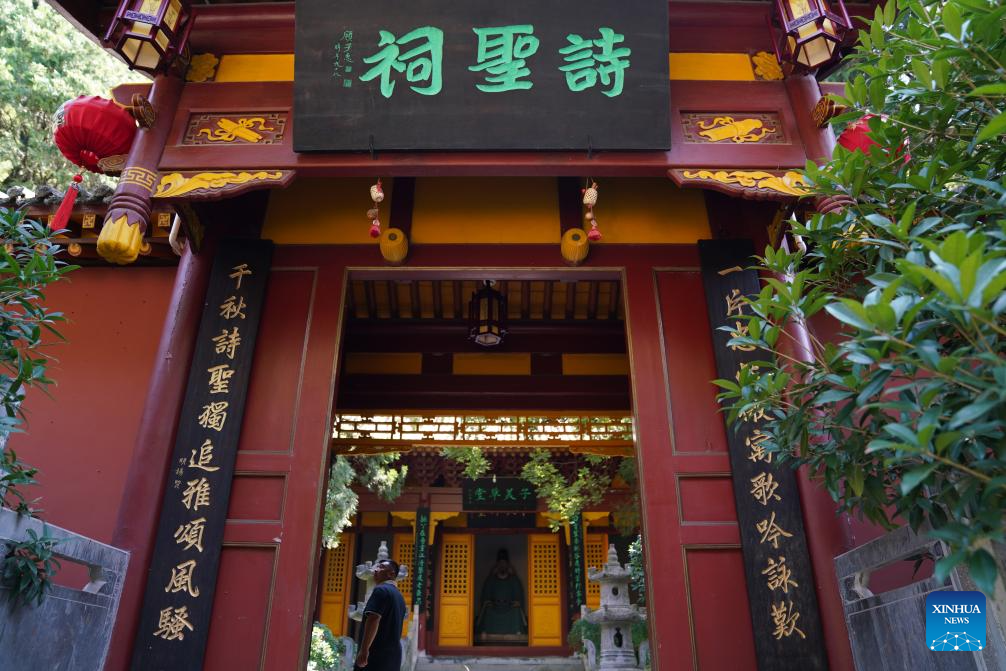
A tourist visits the memorial site of ancient Chinese poet Du Fu in Chengxian County of Longnan, northwest China's Gansu Province, July 13, 2025.
First built in 1123, the memorial site of ancient Chinese poet Du Fu, located at the mouth of Feilong Gorge in the southeast of Chengxian County. While renovations and reconstructions went uninterrupted over the past centuries, it now covers an area of 15 mu (one hectare) with main structures such as the ancestral hall and the stele forest.
Du Fu was a realist poet of the Tang Dynasty (618-907) and is often considered one of the greatest poets in Chinese history. To escape from the havoc of the An-Shi Rebellion, Du led his family southward to Chengdu in 759, and stayed in modern-day Chengxian County during the trip for about a month. This trip as a war refugee left a profound impact on Du and inspired many of his later realist works.
Today, the memorial site is a must-visit for nature lovers and those who want to have a better knowledge of Du Fu and the traditional culture. (Xinhua/Ma Ning)
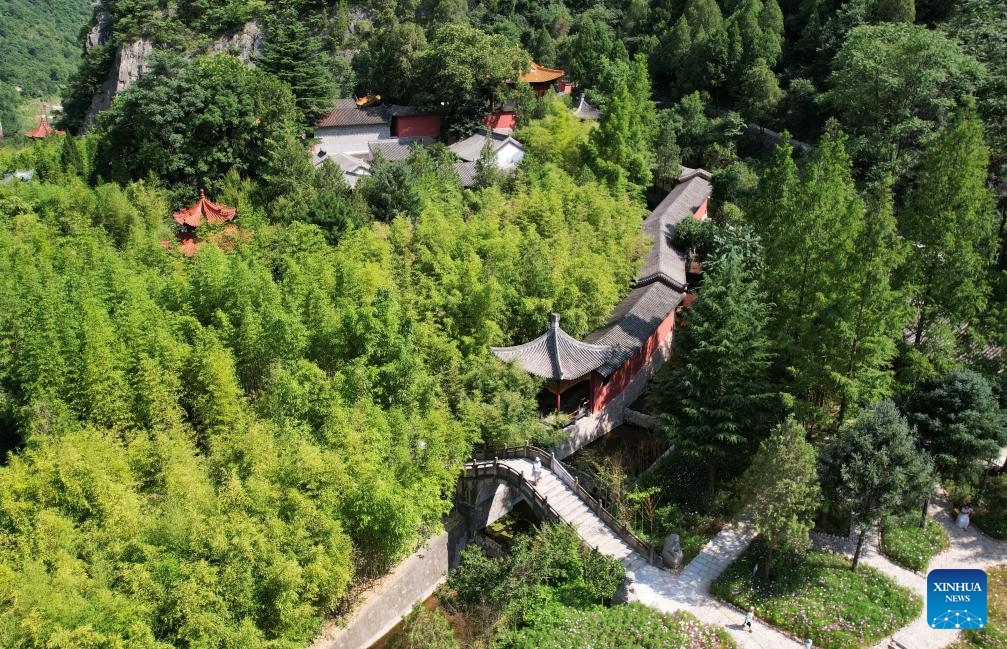
A drone photo shows tourists visiting the memorial site of ancient Chinese poet Du Fu in Chengxian County of Longnan, northwest China's Gansu Province, July 13, 2025.
First built in 1123, the memorial site of ancient Chinese poet Du Fu, located at the mouth of Feilong Gorge in the southeast of Chengxian County. While renovations and reconstructions went uninterrupted over the past centuries, it now covers an area of 15 mu (one hectare) with main structures such as the ancestral hall and the stele forest.
Du Fu was a realist poet of the Tang Dynasty (618-907) and is often considered one of the greatest poets in Chinese history. To escape from the havoc of the An-Shi Rebellion, Du led his family southward to Chengdu in 759, and stayed in modern-day Chengxian County during the trip for about a month. This trip as a war refugee left a profound impact on Du and inspired many of his later realist works.
Today, the memorial site is a must-visit for nature lovers and those who want to have a better knowledge of Du Fu and the traditional culture. (Xinhua/Chen Bin)
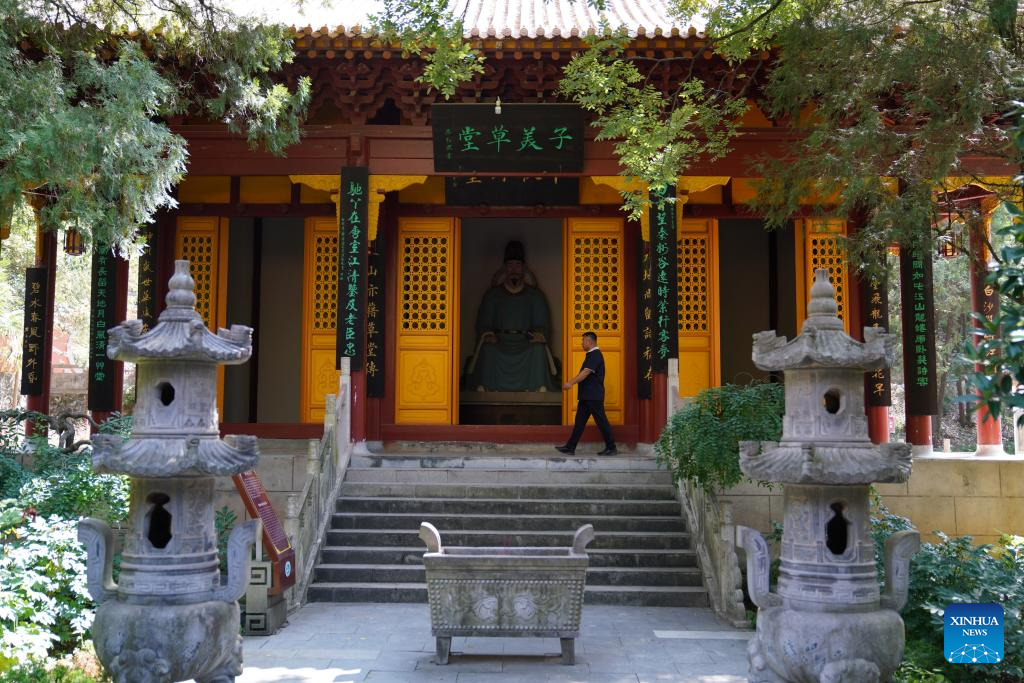
A tourist visits the memorial site of ancient Chinese poet Du Fu in Chengxian County of Longnan, northwest China's Gansu Province, July 13, 2025.
First built in 1123, the memorial site of ancient Chinese poet Du Fu, located at the mouth of Feilong Gorge in the southeast of Chengxian County. While renovations and reconstructions went uninterrupted over the past centuries, it now covers an area of 15 mu (one hectare) with main structures such as the ancestral hall and the stele forest.
Du Fu was a realist poet of the Tang Dynasty (618-907) and is often considered one of the greatest poets in Chinese history. To escape from the havoc of the An-Shi Rebellion, Du led his family southward to Chengdu in 759, and stayed in modern-day Chengxian County during the trip for about a month. This trip as a war refugee left a profound impact on Du and inspired many of his later realist works.
Today, the memorial site is a must-visit for nature lovers and those who want to have a better knowledge of Du Fu and the traditional culture. (Xinhua/Ma Ning)
点击右上角![]() 微信好友
微信好友
 朋友圈
朋友圈

请使用浏览器分享功能进行分享
